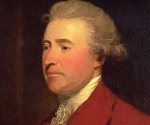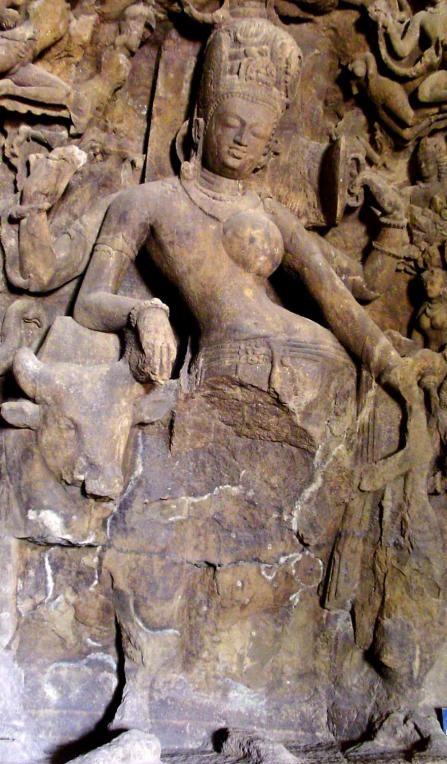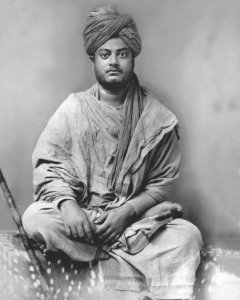
“The greatest creative personality of nineteenth century India” is how the Oxford History of India describes Ram Mohan Roy
A servant of man, pioneer, a cosmopolitan, “Ram Mohan Roy was “a philosophic modernist, a progressive religious thinker, anxious to emphasize the essentials of religion[1]”said Dr, Sarvepalli Radhakrishnan. For Gandhi Roy was “the father of advanced liberal thought in Hinduism.”
Ram Mohan Roy’s ideas bridged many contradictions.
He spread the seeds of spiritual renaissance that led to Independence, and yet welcomed Britain.
After 700 years of Muslim Rule he invited British education to rise up his people, yet Macaulay’s education reforms made “clerks, not statesmen… ‘black Englishmen’ … but not better Indians[2]” Yet failed, claimed Ramesh Chandra Majumdar, to “make the slightest impression” for 99.9% of the vast Hindu Samaj[3]”
His ideas were vast, he was more than any other man, claimed S, Cromwell Crawford, who compares his failures to Jesus. Like Jesus philosophy, his ideas were a seed.
Jesus ideas died in Palestine. Jesus ideas were recrafted by St. Paul and morphed unrecognizably beyond the Nazarene. So Ram Mohan Roys ideas have been claimed by different peoples and his image reshaped by different generations He is claimed by Intelligentsia, Hindus, Muslims, Christians, humanists, and the Brahmo Samaj
Long before I ever entered India he fascinated me, along with the list of reformers that led to Gandhi and beyond. Reform is far more than spouting a religious or political ideal.
Ram Mohan Roy was a champion of dharma, but Dharma is subtle as Bhisma famously said.
The Gita ideal of duty performed detached from the outcome can take many paths reveals the Mahabharata. Similarly, Ram Mohan Roy’s ideas bridged many contradictions. “Ram Mohan Roy considered it expedient to welcome the British as agents of modernization; but had India been strong, united and enlightened, love of the fatherland would have made him forcefully resist the flying of the Union Jack on Indian soil. “ wrote Crawford. At times it was expedient to condemn, other times commend his people.
Early Life
 To understand him we must go back in time. We cannot condemn with the luxury of hindsight away from the pressures two centuries back. Nor see him heroically as “a modern Ullyses” to whom “all mysteries were unveiled, and all idols broken” compared to Voltaire, Volney Diderot and Herder[4].
To understand him we must go back in time. We cannot condemn with the luxury of hindsight away from the pressures two centuries back. Nor see him heroically as “a modern Ullyses” to whom “all mysteries were unveiled, and all idols broken” compared to Voltaire, Volney Diderot and Herder[4].
Born in Radhanagar, Houghly District, Bengal in 1772 to an orthodox Brahmin family with the best education available. Bengal was the centre of British India, but the Mughal’s still ruled the north. Living standards plummeted as wars drained funds, Hindu and Muslim art declined. As the Mughals declined suttee, female infanticide and purdah among Hindu’s and Muslims increased. The ghosts of the Bhakti movement, and the syncretistic like Nanak or Kabir assimilated into new castes. Military ascetics terrorised the northern countryside.
But Ram Mohan’s grandfather Krishnachandra Banerji had been honoured as Raya Rayan for his service to the Nawab of Bengal. His father, a devoted Vaishnavite, was a chief of various districts and made wealth by renting a farm to the governments. He was later zamindar to the royal family of Burdwan.
Ram Mohan Roy was first educated at Patna, groomed for the Muslim courts. He praised Arabian logic, was inspired by the Quran’s monotheism and the character of the Prophet, and was fascinated by Arabian and Persian poetry.
Three years later he studied Sanskrit at Banares at the insistence of his maternal relatives who were, professional priests. At Banares he studied Vedanta, the Upanishads, Smritis, Tantra’s, and Puranas.
When returning home he questioned the validity of his families idol worship, and then left to Tibet where he is recoded to have debated for two or three years disputing with a devotee of “the living Lama”. There his experience taught him to appreciate women.
Returning home, unable to reconcile idols, he eventually left to Calcutta. leaving his wife and family in his mothers care.
His early writing argued true religion is rooted in human nature, and anything against this is a product of habit. Supernaturalism was called on to buttress invented dogmas by religious leaders seeking private glory. Detached from moral sense, rote learners of religion have lost their discrimination and made atrocities into a virtue. Preferring revelation, reason becomes a voice of Satan and fallacious arguments and legends bolster an imagined superiority.
But man has an innate capacity to rationally see the truth of one divine being and the brotherhood of all men.
Faith in God of superior understanding proves only the possibility of something, not the truth of any religious astringency . An overlord may allow different laws for different times or conditions, but could the Great Overlord make contradictory pronouncements: the worship of Hindu idols and simultaneously wage war on idolaters?
He would move into the East India company as a diwan, the highest post allowed for Indians, and be recognised or his honesty, integrity and acumen. He challenged the elitist disrespect of local custom and in Ragpur agitated against sati. He would serve the British government as an envoy in border disputes.
Significantly the speed in which he learned English. He wanted to study the English character and bridge two worlds.
Three British schools of thought
 Edmund Burke was indignant at the East India Company’s officers flaunting their ill gotten exploitation of Indians. Besides his moral outrage, the behaviour of the tabob revealed a constitutional threat of mercantile Mughals on British politics.
Edmund Burke was indignant at the East India Company’s officers flaunting their ill gotten exploitation of Indians. Besides his moral outrage, the behaviour of the tabob revealed a constitutional threat of mercantile Mughals on British politics.
Three approaches evolved. Conservative, liberal and Utilitarian (joined by Evangelicals) and the role of greater administrators who bridged these views.
Burkes Conservative approach demanded just rule adapted to fit the specific character and circumstances of the people. It prohibited rash interference in local institutions. In 1793 The East India Company rejected missionary William Carey because conversion would plant ideas of political unrest.
Conservative rule was supported by the Orientalists, pioneered by William Jones and Charles Wilkins. Jones postulated a common ancestry to Sanskrit and Classical European languages. Jones translation of Kalidasas Shakuntela astounded the English imagination. He placed the Mahabharat and Ramayan with Shakespeare claiming Indian art made her an equal to Europe but different. He promoted respect for other cultures and the eradication of cultural ignorance.
More liberal thought took three forms: To Liberals improvement meant Western education; the utilitarian : improvement good laws and to the evangelicals that joined them Christianity and conversion.

William Bentinck
The Liberal and evangelicals efforts resulted in the Charter of 1813 and the introduction of missionaries. Governor General of India, William Bentinck was influenced by strong willed reformers John Stuart Mill and Utilitarian Jeremy Bentham. Bentham argued “the greatest happiness of the greatest number that is the measure of right and wrong.” Social reform had made great strides in Britain. Unrest had followed the abuses of the Industrial revolution and Bentham would push for reform, fearful of possible revolution. The Enlightenment and scientific progress had enlivened Britain Liberals believed India paralysed and moribund.

John Stuart Mill
Mills text was part of the East India Companies curriculum. Social reforms in India had been previously accidental. He stridently attacked the British East India Company, British ignorance and aggression imperialism and the evils inflicted on Indian society. Mill also expressed contempt for Indian societies abject arrested development. Mill claimed religious barbarism had structured every aspect of life, government, social position laws to the deity and philosophic discussion of the divine seemed fantastic, wild and irrational, not a product of cultivated reason. Before Macaulay, he claimed William Jones was wrong to praise India’s art and poetry as Britain’s equal. The Mahabharata and Ramayana were out of touch with the physical and moral laws of the universe. Hindu saints were bound by ceremony and not the moral upliftment of the people[5].

Charles Grant
While politically poles apart, Evangelicals equally sought the inner reform of society. For example, Charles Grant believed India deserved good government in return for the profits made by Britain “in order to continue to hold the advantage we derived from them.”
The British East India Company derives from the Christian Community so is duty bound o promote “the general welfare of the many millions of under its government.” However it was morally wanting compared to the “profound peace” under Aurangzeb. Improvement of government, and not its abdication, was required. Not just legislation but moral change of the evil ways rooted in the Indian people by its religion. Before Macaulay he promoted English education that would give temporal wealth and open away for the Gospel for Spiritual prosperity. Bishop Wilberforce, who helped remove slavery, supported Grants ideals.
However, the Charter of 1813 was uncritically accepted because it gave profit a righteous sanction and a pretence of morality to British rule. It was not blind to British injustice but claimed there was no alternative.
Thirdly, the Great administrators
With a foot in both camps included Mountstuart Elphinstone and Thomas Munro, preaching patience and caution.

Mountstuart Elphinstone
Elphinstone promoted reforms but the former diplomat did not agree foreign cultures were degraded. His second arrival to India was in 1819. In Bombay he observed “I doubt whether anybody could tell me what was good for the Maharattas. I was certain that I could not, an therefore I wanted to be taught by time.”[6]
The governor of Madras, Thomas Munro, reversed Cornwallis system of of zarmindas allowing peasants proprietorship..Because of his historical knowledge, he knew that the recent wars, and not moral or religious poverty taught by evangelicals, had ravaged the land.
Moving into the 19th century, attempts to regulate European traders who had state like powers.
Ram Mohan Roys response
Ram Mohan Roy responded by a process of synthesis that encouraged internal development of the Indian people.
Within India, aristocrats be-cried the wrongful seizure of lands and the disruption of traditional values and practise. Different values prevailed: Europe treated war like science when Indian rulers considered it more a sport
Meanwhile, India’s new middle class responded to Europe in three ways: Orthodox, Radical and Liberal.

Radha Kanta Deb
The Orthodox accepted political but not a cultural submission. They held tenaciously to the past and ignored the future. At first Britain agreed and missionaries were minimal. But tensions would eventually explode in the 1857 revolt. A noted advocate of this position was scholar Radha Kanta Dob, who challenged Ram Mohan Roy and formed the Patitoddhar Sabha to reclaim converts back from Christianity.
The Radicals, or Young Bengals, from Hindu College were influenced by Anglo-Indian Henry Dorozio. To embrace Western rationalism. They studies the likes of Voltaire, Hume and Bentham and looked to a national future.
“By their integrity, dignified conduct and contentiousness coupled with intellectual ability, they enhanced the self respect and evaluated the moral stature of their society. They were men of honour in whom the nationalist sentiment – the love of India-first manifested itself” wrote historian Vincent A. Smith[7].
Yet they were too radical to last beyond 1840: they rejected the past and in protest were baptised Christians, ate beef and drank beer.
The liberals led by Ram Mohan Roy blazed the middle way. Liberals rejected both the cultural isolation of Traditionalists and cultural abdication of the Radicals. They would never eat beef, yet from 1815 to 1830, Roy would promote a (then) un-Indian concept of modern nationalism that had no precedent.
This was achieved through reason from the Upanishads .
“Once this was accepted the western challenge could be met face to face. Western loans would not involve eastern apostasy; loyalty and reform could go hand in hand” wrote Anglophile Victor Smith .
Ram Mohan Roy offered both the traditional riches and future hopes, Westernized and still Hindu.
Grateful for the ‘useful mechanical arts’ introduced by the West, but to science, literature and religion “I do not acknowledge that we are placed under any obligation.”
He argues that continued Indian loyalty depended on continuing the civil liberties granted under British rule. In particular, he argues for freedom of the press. Indian princes had kept people in darkness and this inspired revolt. Free press helps good government, he argues, by revealing the errorsor injustice of leaders because of our imperfect human nature.
In 1828, he supposes ‘one hundred years hence’, discourse with Europeans, will result in the rise of Hindu nationalism, especially on occasions when restrictive regulations are applied by the British.
“His attitude toward the West was neither that of surrender, or withdrawal, or conflict. It was one of comprehension. The new world from the West was not a substitute but a supplement to the old. Synthesis, which is different from syncretism, was his remedy for the predicament of Hinduism7”
This was possible because of the organic connection of profane and spiritual inherent in tradition and dharma. In the West, Descartes had separated profane and spiritual. Hindu religion has no separate domains.
“The more real religion is, the more concerned it is with its own overcoming” wrote S. Cromwell Crawford. Nothing is therefore profane or to crass that it cannot be sanctified[8]. “In the absence of this explanation, it is difficult to explain the Raja’s reforming genius.”
Although inspired by social Christian message, Roy would be discouraged by the elitist assumption – perhaps well meaning enthusiasm – that people will want Christianity. Christianity had its own history of religious violence.
The range of Ram Mohan Roys genius in religious, political, judicial administrative and economic reform as well as his philosophy of ethics is to vast for this article.
Ram Mohan Roy sought to lift his people from degradation to divinity, from superstition to rationality. His translations of the Upanishads lifted the dark veil of Sanskrit before Hindus and invited others to appreciate Hindu thought.
His promoting Hindu monotheism made him Hindu friends and enemies, and gave him a Western audience.
The Puranas and Tantras describe gods and goddesses, he said, but admit they are an aid for the less educated, of a greater harder to grasp divine unity. Idols have divided the people into Hindu sects, belief in the nationalism of Hindu that embraced one uniting god.. It was time to ditch them and return to the Veda’s monotheism.
Ram Mohan roy offered Indians a way out of the divisive corruptions while retaining Indian self respect by rediscovering Hindu monotheism. He argued that these were an ‘allegoric adoration’ which had over time developed a life of their own and covered the truth of the one supreme being.
To deify the natural forces in a phenomenological world divides experience. Humanising elemental forces we enter into the muddy world of sectarianism: whether of Krishna, Jesus, or Mohammad.
He used the same analysis on the Christian Bible. Many Christians were fascinated to learn of Hinduisms monotheistic roots. But when Ram Mohan wrote on the moral ethic of Jesus, many Christians objected that morality was not enough unless one accepts the Deity of Jesus in the Trinity. With extensive Biblical knowledge he demonstrated that belief in the One God with appropriate moral conduct was all that was required. From the Bible alone he argued strongly against the Trinity,
Magnanimous to those who Christians helped elevate the people he hoped they would return in kind, but was disappointed when they maligned everything Indian. The poor in Europe are equally uneducated he argued. The Bible describe God in anthropomorphic terms, so why derive Hindu texts for doing the same?
Proselytizing was a breach of ethics. Ram Mohan Roy reminds the British that they see themselves as guardians of justice, so why act like savage conquerors of former times?
On the surface there are differences between Hindu and Christian, but look in to the depths of each faith and you find more similarities.
As V.G Kiernan reminds us in The Lords of Human Kind, justified complaint rests not to what the British actually did, but to how they did it. British meddling fuelled the Indian reaction and resistance begun in 1856.
Mostly, as Nehru reminds us, British rulers were lilly-hearted bureaucrats who contemplated change only if it were safe.
Ram Mohan Roy however had a grand vision. He did not choose his circumstances, but spared no effort to liberalise them. He planted a seed, and its tree has spread and morphed over generations: perhaps beyond his ideas.
[1] From S.Cromell Crawford, 1984, Ram Mohan Roy: Social political and religious reform in the 19th century India, Paragon House Publishers.
[2] Acharya Ramadeva quoted bt Gandhiin Navajivan, 20-1-1929, Collected Works of Mahatma Gandhi, VOL.44 :16 JANUARY, 1929 -3 FEBRUARY, 1929
[3] Ramesh Chandra Majumdar,On Mohan Roy, Asiatic Journal, 1973, p. 40.
[4] Sir Brajendra Nath Seals oration, “Ranmohan Roy: The Universal Man” 1933.
[5] In contrast, Gandhi argued Belief that sins were forgiven in Jesus removed responsibility of self improvement from a Christian but Hinduism taught responsibility in the karma doctrine.
[6] Quoted M. E. Chamberlain,1974, Britain and ndiaArchon Books, Connecticut.
[7] Vincent A, Smith p733, TheOxford History of India, ed. Percival Spear(3rd ed. Oxford Clarendon Press, 1958). It is important to note Smiths wrote under colonial ideas that India needed European “benign” guidance.
[8] A Westerner may compare this to the Jewish concept of elevating the profanr to the spiritual realm through a mitzvah or commandment performed after a blessing.
23.259933
77.412615




























